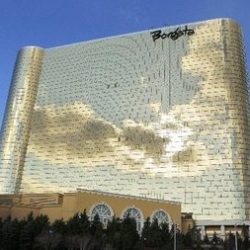MGM Resorts has returned to the New Jersey gaming market, which is a rare good sign for the Atlantic City. On Wednesday, New Jersey casino regulators agreed to allow MGM Resorts back into the Atlantic City casino market.
Until 2010, MGM Resorts owned 50% of the Borgata Casino, long the most profitable of the Atlantic City gaming destinations. Due to a dispute with the Division Gaming Enforcement over MGM Resorts’s ties to Macau gaming interests, the company walked away from the Borgata interests. Instead, its 50% share has been operated by a trust for the past four years.
Settling Old Scores
A buyer was never found, and MGM Resorts recently began taking steps to repair its strained relationship with the DGE. The company had never settled an old dispute involving its ties to convicted felon Terry Christensen, a former board member. A few weeks ago, that affair was settled, as the gaming company and MGM Resorts founder Kirk Kerkorian‘s company paid a $225,000 in fines to the state of New Jersey.
That seemed to heal the rift, and set the stage for this week’s reconciliation. On Wednesday, the Casino Control Commission approved MGM Resorts’ petition to return to New Jersey. The commission’s chairman, Matthew Levinson, said, “I welcome MGM back to New Jersey. I believe it will be a key player in New Jersey.”
Pansy Ho Case
In 2010, New Jersey gaming regulators announced they were concerned about MGM Resorts’ ties to Pansy Ho, who is their business partner in their Macau gaming operations. Pansy Ho is the daughter of the legendary Macau gaming mogul, Stanley Ho, who is called the “King of Gambling” in China.
New Jersey’s regulators called into question Pansy Ho’s ties, because her father has long been whispered to have ties to Chinese organized crime. MGM Resorts took exception to those charges at the time, saying Pansy Ho had little say in the American company’s US endeavors, and therefore had little sway in the running of the Borgata.
MGM Resorts Stepped away from Borgata
In a sign of the relative importance of their various business interests, MGM Resorts walked away from their stake in the Borgata these past four years. They continued to do business with Pansy Ho and her father. That was a calculated decision, because their Macau gaming operations bring in a lot more revenues than the Borgata.
Macau is now the world’s capital of casino gambling, and the race isn’t even close. Macau makes seven times the revenues of Las Vegas any given year, while Las Vegas far outstrips the revenues of Atlantic City. There simply was no choice between the two.
New Jersey Market Much Different
Since the dispute, the business side of the Macau operation has changed. Stanley Ho’s gaming company has gone public on the Hong Kong Stock Exchange. Pansy Ho’s stake in the company has dropped from 50% to 24% and she has no hand in the day-to-day operations of the company. With those changes, MGM Resorts was free to petition to be allowed to return to New Jersey.
At the same time, the gaming market in Atlantic City has changed a great deal since MGM Resorts left town. This year alone, four Atlantic City casinos have closed their doors, and a fifth appears ready to shut down operations in November.
Borgata Since the Chance
Borgata remains the strongest casino of the 7 remaining in the city. In the recent quarterly reports, Borgata showed almost one-half of the operating profits among the casinos. Borgata’s online casino and poker room also lead the market. Thus, the return of MGM Resorts brings with it primacy in the market like it’s never seen.
The company would want to re-enter the market for several reasons, besides the obvious reason. The online gambling license is a new source of revenue for MGM Resorts, and one which could be expanded into a multi-state gaming license, if the state leaders of New Jersey choose to expand alongside Delaware and Nevada. Also, Borgata might be accepting sports bets in the next 45 days, if a court decision by Judge Michael Shipp goes the way Governor Chris Christie hopes it will.
Finally, Borgata faces less competition than it did four years ago. The Revel Casino, Atlantic Club, Trump Plaza, and Trump Taj Mahal have closed because market saturation left those operations with too few customers. The Showboat Casino was profitable, but it’s parent company, Caesars Entertainment, decided to close down the operation to decrease competition. All told, the closings should drive more customers to the seven remaining operations. If all goes well, a market correction should have occurred and Borgata should remain healthy–even vital.

